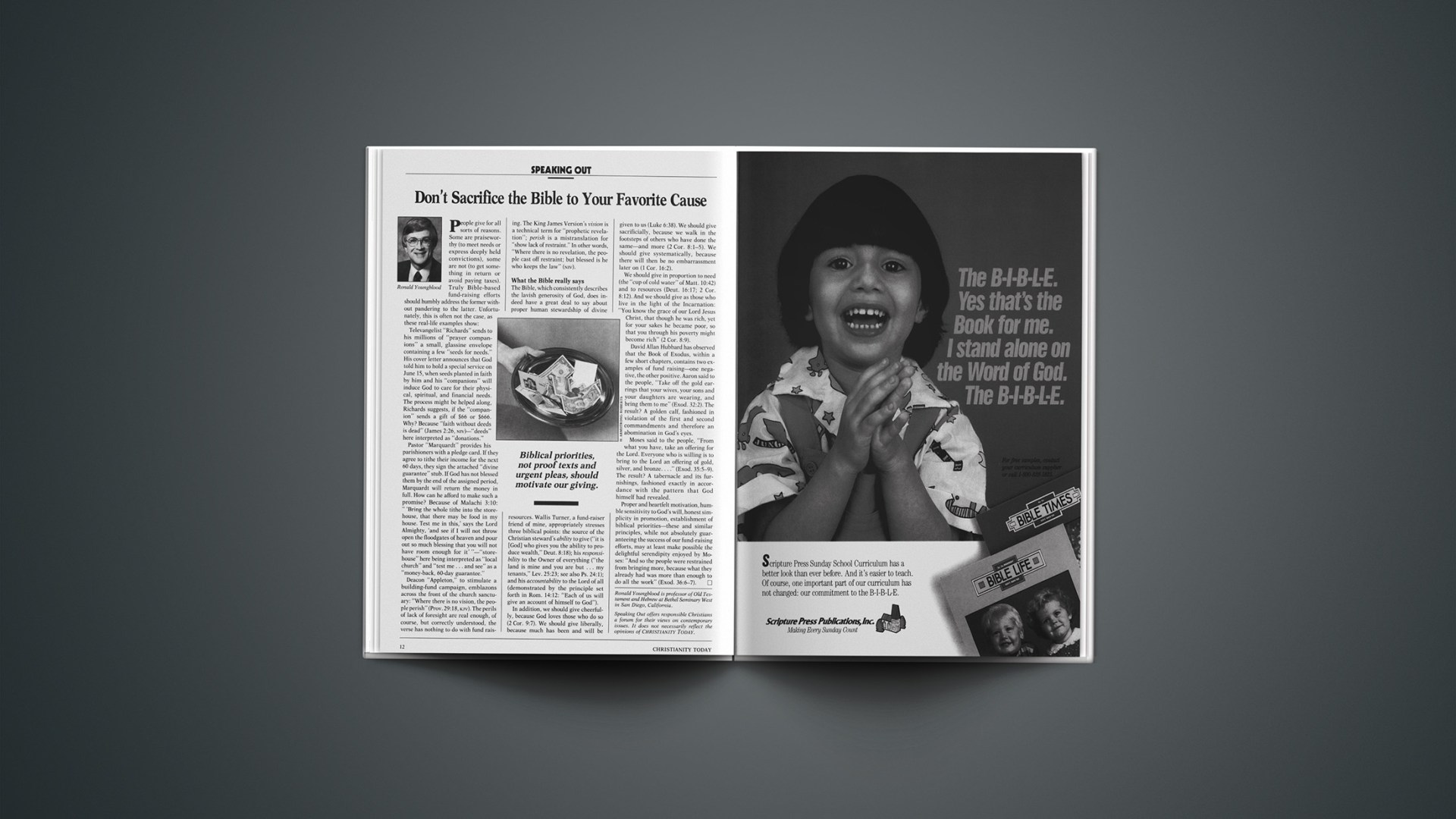People give for all sorts of reasons. Some are praiseworthy (to meet needs or express deeply held convictions), some are not (to get something in return or avoid paying taxes). Truly Bible-based fund-raising efforts should humbly address the former without pandering to the latter. Unfortunately, this is often not the case, as these real-life examples show:
Televangelist “Richards” sends to his millions of “prayer companions” a small, glassine envelope containing a few “seeds for needs.” His cover letter announces that God told him to hold a special service on June 15, when seeds planted in faith by him and his “companions” will induce God to care for their physical, spiritual, and financial needs. The process might be helped along, Richards suggests, if the “companion” sends a gift of $66 or $666. Why? Because “faith without deeds is dead” (James 2:26, NIV)—“deeds” here interpreted as “donations.”
Pastor “Marquardt” provides his parishioners with a pledge card. If they agree to tithe their income for the next 60 days, they sign the attached “divine guarantee” stub. If God has not blessed them by the end of the assigned period, Marquardt will return the money in full. How can he afford to make such a promise? Because of Malachi 3:10: “ ‘Bring the whole tithe into the storehouse, that there may be food in my house. Test me in this,’ says the Lord Almighty, ‘and see if I will not throw open the floodgates of heaven and pour out so much blessing that you will not have room enough for it’ ”—“storehouse” here being interpreted as “local church” and “test me … and see” as a “money-back, 60-day guarantee.”
Deacon “Appleton,” to stimulate a building-fund campaign, emblazons across the front of the church sanctuary: “Where there is no vision, the people perish” (Prov. 29:18, KJV). The perils of lack of foresight are real enough, of course, but correctly understood, the verse has nothing to do with fund raising. The King James Version’s vision is a technical term for “prophetic revelation”; perish is a mistranslation for “show lack of restraint.” In other words, “Where there is no revelation, the people cast off restraint; but blessed is he who keeps the law” (NIV).
What The Bible Really Says
The Bible, which consistently describes the lavish generosity of God, does indeed have a great deal to say about proper human stewardship of divine resources. Wallis Turner, a fund-raiser friend of mine, appropriately stresses three biblical points: the source of the Christian steward’s ability to give (“it is [God] who gives you the ability to produce wealth,” Deut. 8:18); his responsibility to the Owner of everything (“the land is mine and you are but … my tenants,” Lev. 25:23; see also Ps. 24:1); and his accountability to the Lord of all (demonstrated by the principle set forth in Rom. 14:12: “Each of us will give an account of himself to God”).
In addition, we should give cheerfully, because God loves those who do so (2 Cor. 9:7). We should give liberally, because much has been and will be given to us (Luke 6:38). We should give sacrificially, because we walk in the footsteps of others who have done the same—and more (2 Cor. 8:1–5). We should give systematically, because there will then be no embarrassment later on (1 Cor. 16:2).
We should give in proportion to need (the “cup of cold water” of Matt. 10:42) and to resources (Deut. 16:17; 2 Cor. 8:12). And we should give as those who live in the light of the Incarnation: “You know the grace of our Lord Jesus Christ, that though he was rich, yet for your sakes he became poor, so that you through his poverty might become rich” (2 Cor. 8:9).
David Allan Hubbard has observed that the Book of Exodus, within a few short chapters, contains two examples of fund raising—one negative, the other positive. Aaron said to the people, “Take off the gold earrings that your wives, your sons and your daughters are wearing, and bring them to me” (Exod. 32:2). The result? A golden calf, fashioned in violation of the first and second commandments and therefore an abomination in God’s eyes.
Moses said to the people, “From what you have, take an offering for the Lord. Everyone who is willing is to bring to the Lord an offering of gold, silver, and bronze.…” (Exod. 35:5–9). The result? A tabernacle and its furnishings, fashioned exactly in accordance with the pattern that God himself had revealed.
Proper and heartfelt motivation, humble sensitivity to God’s will, honest simplicity in promotion, establishment of biblical priorities—these and similar principles, while not absolutely guaranteeing the success of our fund-raising efforts, may at least make possible the delightful serendipity enjoyed by Moses: “And so the people were restrained from bringing more, because what they already had was more than enough to do all the work” (Exod. 36:6–7).
Ronald Youngblood is professor of Old Testament and Hebrew at Bethel Seminary West in San Diego, California.
Speaking Out offers responsible Christians a forum for their views on contemporary issues. It does not necessarily reflect the opinions of CHRISTIANITY TODAY.










